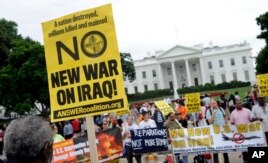25 June, 2014
President Barack Obama is sending hundreds of troops to Iraq to help the country's armed forces stop unrest. The Obama administration now faces questions on whether the troop deployment will lead to a full-fledged, or expanded, involvement in Iraq. VOA White House correspondent Luis Ramirez is following the president. Here is his report.
Sunni Muslim rebels in Iraq are tightening their control of more towns. Some observers question whether the deployment of up to 300 military advisers may be too little, too late. The advisers are meant to give the Iraqi government the support it needs to end the rebellion.
President Obama sent Secretary of State John Kerry to Iraq earlier this week. He told Mr. Kerry to push for unity against the Islamist rebels and for an Iraqi solution.

Demonstrators protest outside of the White House in Washington against renewed U.S. involvement in Iraq in Washington, D.C., June 21, 2014.
Josh Earnest is the president's spokesman. "This administration does believe that there is time for Iraq's political leaders to make the necessary decisions that will unify the country to confront the terrorist threat, the extremist threat that they're facing in Iraq right now."
The job of the United States advisers is to study the abilities of the Iraqi military. Many Iraqi soldiers reportedly have left the military. And the remaining soldiers are said to hold a low opinion of the force.
In addition to the U.S. advisers, the president has approved other orders. He told up to 275 troops to protect the United States embassy and other American interests in Iraq.
Julian Zelizer teaches political history at Princeton University in New Jersey. He told VOA on Skype that it may be difficult for the Obama Administration to keep the number of U.S. troops in Iraq low.
"Once you send 300 people there at a minimum, if they recommend the need for more, it's hard for the president to then ignore the very people he sent to find out what should be done."
Professor Zelizer says past conflicts have shown how small deployments can lead to much bigger operations. He notes what happened to the United States in Vietnam and Korea.
"Each time the mission gets bigger, the involvement gets bigger. It's very difficult to contain these situations."
The situation in Iraq has worsened in recent weeks. The United States has already made a big investment in the country. The challenge to limit U.S. involvement is perhaps even greater. I'm Jonathan Evans.